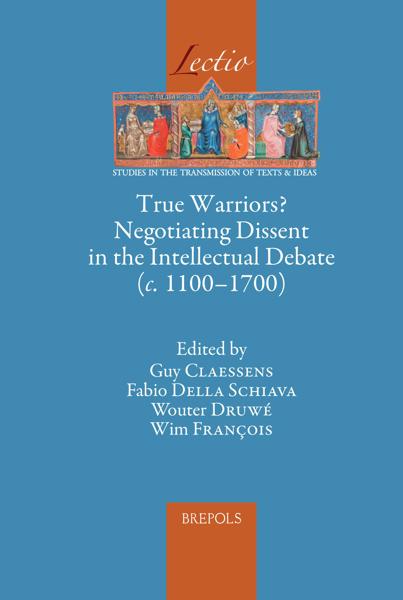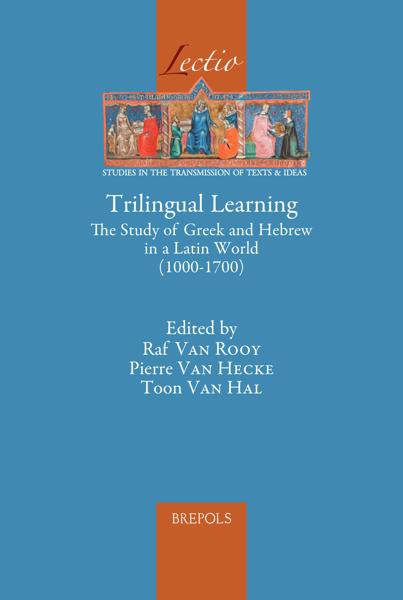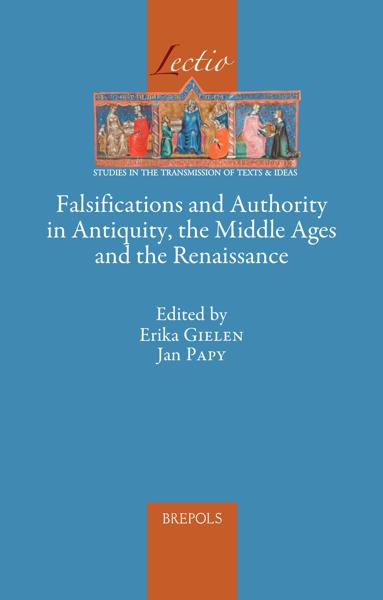
Innovationes Lovanienses: Arts, Law and Theology at the University of Louvain (1425–1797)
Studium Lovaniense: Learning across Borders, 2
Violet Soen, Wouter Druwé, Wim François, Ralph Dekoninck (eds)
- Pages: approx. 440 p.
- Size:156 x 234 mm
- Illustrations:17 col., 2 tables b/w.
- Language(s):English, Latin
- Publication Year:2026
- € 115,00 EXCL. VAT RETAIL PRICE
- ISBN: 978-2-503-61819-7
- Hardback
- Forthcoming (May/26)
- ISBN: 978-2-503-61820-3
- E-book
- Forthcoming
*How to pre-order?
Studies on classic and innovative ideas across various constituent bodies of the University of Louvain, such as the Faculty of Arts or the College of the Three Tongues, or neighboring institutions, like the Jesuit College
Violet Soen, Wouter Druwé and Wim François teach at KU Leuven, and have co-ordinated the five-year research program @Aulam about ideas and books at the early modern Faculties of Theology and Law in Louvain. They are all members of LECTIO, the KU Leuven Institute for the Transmission of Texts, Images and Ideas through Antiquity, the Middle Ages and the Renaissance. Ralph Dekoninck teaches at the UCLouvain where he is co-directing the Schol’Art project devoted to The early modern theories of arts and letters in the light of scholasticism, within GEMCA, the Centre for Early Modern Cultural Analysis.
Throughout the first centuries of its existence, the University of Louvain functioned as a crossroads for the transmission of texts, ideas, and even images from Antiquity, across the Middle Ages, and through the Renaissance. From its foundational bulls between 1425 and 1432, the university was established as a prototypical studium generale, drawing inspiration from earlier institutions in Paris and Cologne and adopting elements from contemporary universities like Rostock and Geneva. Situated at the heart of Europe, the University of Louvain quickly became a pivotal center for the reception and dissemination of both ancient and contemporary knowledge across the continent, and later, the Habsburg Empire. This volume examines how teachers and students examined old and innovative ideas across various constituent bodies of the university, including the Faculty of Arts or the College of the Three Tongues, or neighboring institutions, like the Jesuit College. Contributions span the Faculties of Law, adopting insights on the newly promulgated Tridentine decrees or novel moral economies, to the Faculty of Theology, a hotbed of the controversies surrounding grace, free will, and salvation in post-Tridentine Catholicism. Of the many scholars that were active in Louvain, special attention is devoted to the philologist Petrus Nannius, the theologians Michael Baius and Jacobus Janssonius, the lawyers Petrus Peckius and Johannes Wamesius, and the Jesuits Robertus Bellarminus and Leonardus Lessius, along with the lectures they gave at the Louvain house of their Order.
Introduction
Innovationes Lovanienses: What Is New about the ‘Old’ University of Louvain (1425–1797)? (Violet Soen)
Part I. The Faculty of Arts and the Collegium Trilingue
The Old and the New: Scholastic Elements in the Works of Petrus Nannius (1496–1557), Professor of the Collegium Trilingue in the First Half of the Sixteenth Century (Aline Smeesters)
Diagrammatic Innovations in Louvain Logic Notebooks (Seventeenth-Eighteenth Centuries) (Lorenz Demey)
Part II. The Faculties of Canon and Civil Law
The Role of Legal Practice in Louvain’s Legal Education (c. 1550–1650) (Wouter Druwé)
What Makes a Legal Commentary? Louvain Professors on Liber extra and Liber sextus (Sixteenth-Eighteenth Centuries) (Piotr Alexandrowicz)
Teaching Canon Law after Trent: Mapping Juridical Sources in the Lectures of Petrus Peckius (1529–1589) (Ana Luiza Ferreira Gomes Silva)
When the Sun Stopped Setting: Louvain Lawyers and Theologians on Issues of Monopolies and Competition (1500–1670) (Wout Vandermeulen)
Part III. The Faculty of Theology and the Jesuit College
Knowledge of Nature and Scripture at the Threshold of Modernity: Michael Baius’s (1513–1589) Louvain Lecture on Romans 1 (Jarrik Van Der Biest)
The Internal Act of Faith in the Commentaries on the Summa theologiae Produced in Sixteenth- and Seventeenth-century Louvain (with a Comparison with Previous Iberian Commentators) (Lidia Lanza)
The Jesuit College and Knowledge Transmission: Robert Bellarmine’s Lectiones Lovanienses (1570–1576) and the Spanish Scholastic Legal-Economic Thought (Shiri Roelofs)
Ex nudo Dei beneplacito: On Concord and Discord between Luis de Molina’s Concordia (1588) and Leonardus Lessius’ De gratia efficaci (1610) (C. J. (Niels) de Bruijn)
Vision, Love, and Joy: The Louvain Jesuit Leonard Lessius (1554–1623) on Beatitude (Patrícia Calvário)
Index




